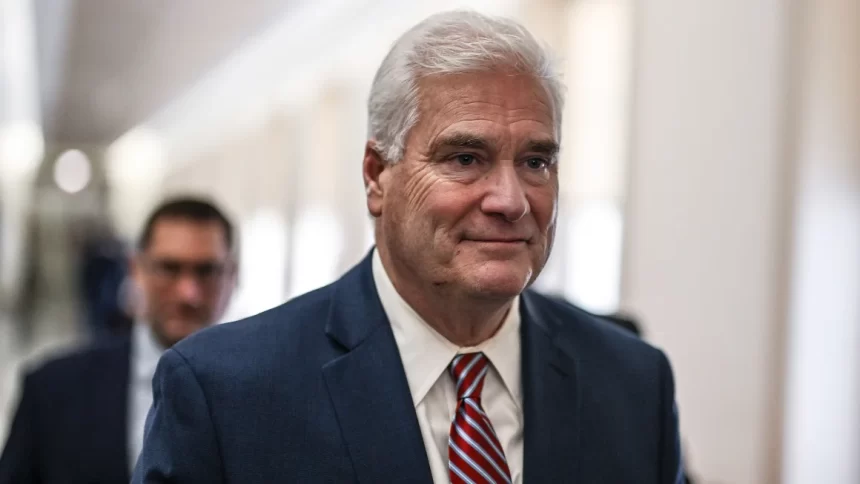Republicans’ House speaker morass continued Tuesday with a little help from former President Donald Trump.
Yet another lawmaker with support from most House Republicans – Rep. Tom Emmer of Minnesota, who was picked as their party’s nominee – failed to get the support of nearly all Republicans. He dropped out of the running Tuesday afternoon, leaving Republicans again back at square one. Late Tuesday, the GOP conference selected a fourth nominee, Rep. Mike Johnson, who faces a floor vote Wednesday.
Emmer, who supports military aid to Ukraine and who voted to certify the 2020 election, saw his chances fade in the most bizarre possible way hours after being picked.
Trump lobbied against Emmer with a social media post that hit while Emmer was trying to convince a few dozen skeptics on Capitol Hill and Trump was inside a New York courtroom facing civil fraud charges. Trump later told reporters outside the courtroom, “It looks like he’s finished.”
After one fired speaker and three failed candidates who got majority but not universal support, no one seems currently capable of uniting their tiny House majority – and the idea of getting help from Democrats remains, for now, unthinkable to both Republicans and Democrats.
A picture of parties divided
It’s a situation that highlights not only Republican divisions, but also the bright line between Republicans and Democrats on Capitol Hi
But it’s important to note that it was born of a fringe protest meant to demonstrate there’s no difference at all between the two parties.
What is ‘uniparty?’
The term “uniparty” has been a favorite of people like Steve Bannon, the former Trump White House official turned podcaster. He’s been using it for years in conjunction with the similarly cynical idea of Washington as a swamp that needs to be drained or the belief in a deep state that needs to be rooted out.
Bannon’s goal is to mobilize support for dismantling the current version of the US government.
The term also features prominently in the more-conservative-than-Fox-News media environment – networks like One America News, known as OAN, and Salem Radio.
‘Guerilla war’
“Right now, we are governed by a uniparty,” Rep. Matt Gaetz, the Florida Republican, told the former Trump administration official Sebastian Gorka in a September interview on the right-wing Salem News Channel in which he argued then-Speaker Kevin McCarthy was in cahoots with President Joe Biden and the Democratic leader, Rep. Hakeem Jeffries of New York. Gaetz posted the interview on his official House website.
“You’ve got a small band of House conservatives who are fighting, really, in a lot of ways, a political guerrilla war against that uniparty,” Gaetz said. In early October, it was Gaetz who moved to successfully oust McCarthy from the speakership.
The parties actually have very different priorities
It’s indisputable that government spending has ballooned in recent years and reasonably arguable that it is out of control. But blaming a perceived “uniparty” is oversimplified nonsense.
Republicans under Trump passed a tax cut bill all by themselves. Democrats under Biden passed a spending bill without help from Republicans.
Reforming costly programs seems impossible because the two parties rarely work together, not because they secretly collude.
If there is a uniparty, where is its speaker?
Multiple Republicans who supported McCarthy have argued Democrats are to blame for the current lack of a speaker because they did not break party ranks and support McCarthy.
There has been no substantive movement toward a unity speaker of some sort, although it is becoming hard to imagine any Republican getting enough support to become speaker without help from some Democrats.
The current math is that any Republican can lose the support of only four party comrades and become speaker without Democratic help.
Next funding deadline is November 17
Another lawmaker who voted to oust McCarthy is Rep. Andy Biggs of Arizona, who argued back in September that allowing the government to run out of money would not be that bad.
“Don’t let the DC uniparty scare you into thinking that a government shutdown is the end of the world,” Biggs said on social media in September, before McCarthy used Democratic votes to pass a funding bill.
This is a line of thinking that will get more attention, perhaps, when the government again faces a funding lapse November 17.
RELATED: The last time the government faced a funding lapse, just last month, CNN documented how a government shutdown could impact Americans.
Any potential speaker must find a way to both get the support of people like Gaetz and figure out how to fund the government in a little more than three weeks.
Emmer’s downfall is yet another cautionary tale. The majority of House Republicans backed Emmer, their fourth choice this year to be speaker, in both secret ballot voting and a behind-closed-doors roll call vote.
He had been working to convince holdouts when the post opposing him hit Trump’s social media account. For the fringe of the party, counts against Emmer include that he is a supporter of additional funding for Ukraine to repel Russia’s invasion. Foreign aid is a chief target of those who believe there is a uniparty.
A quarter of Americans don’t feel represented by any party
Politico noted back in 2017 that the term has roots on the American left, in the rhetoric of Ralph Nader, the consumer advocate turned Green Party presidential candidate.
While there is not much polling on the idea of a uniparty, there is a lot of polling about the two main political parties.
In a Pew Research Center survey published in September, just 10% of Americans said they saw “hardly any” difference between the parties. A larger portion of the country – 25% – does not feel either party represents the interests of people like them, but that sentiment is held by roughly equal shares of Republicans and Democrats.
Similarly, about a quarter of both Republican and Republican-leaning voters and Democratic and Democratic-leaning voters do not feel well-represented by their parties.
Interestingly, despite gripes about a uniparty by the Republican fringe, Republicans are less likely than Democrats to express an interest in more party choices, according to Pew’s survey.










